You'll notice that the score table in this guide is no longer displaying. This is because the guide is over 5 years old and the scores were out of date. We have a programme of reviewing guides to schedule updates and this one is under consideration.
Finding ethical over the counter medicine
Pharmaceutical companies are paradoxical. On the one hand, they are involved in ameliorating suffering and saving lives, which should be the most ethical activity on earth. On the other hand, it is hard not to be horrified by many stories of their behaviour.
This paradoxical nature stems from the system that has been set up.
The basic problem is that the profit incentive, and the patent system which is used to pay for drug innovation, clashes quite badly with the provision of basic needs.
As will be talked about below, the system that we have has resulted in more than half of pharmaceutical company spending going on things that are pretty worthless, or even actively harmful: researching copycat drugs that do little for health, engaging in marketing that sways doctors away from prescribing on the basis of the evidence, and fighting legal battles.








